Guest blogged by DES
This week, Broward County, Florida, Elections Supervisor Brenda Snipes said, with a straight face, "No one could have anticipated that this election would be so historic and draw as much attention as it has," and defended her choice to oppose expanding early voting hours next week due to "logistical problems."
In addition to the problems in Florida, there are now reports that longtime GOP "voter fraud" hoaxster Pat Rogers (also known for his involvement in the U.S., Attorney Purge Scandal for the bogus "voter fraud" allegations he filed in 2004, and as a board member of the now-defunct and fully-debunked GOP astro-turf group, "American Center for Voting Rights," or ACVR), is apparently using private investigators to intimidate voters in New Mexico.
Details on those stories and many more --- pre-election litigation over polling place photo I.D. restrictions in Georgia and Ohio, absentee military ballots in Virginia, GOP efforts to close early voting polling places in Indiana, GOP calls for the Dept. of Justice to investigate ACORN just days before a federal election --- from across the country, all follow in the detailed round-up below...
FLORIDA
First, some specific background on the problems in Florida: In 2005, the Republican-dominated Florida State Legislature voted to change the rules for early voting, cutting the number of early voting sites and reducing the hours the sites were open. Excitement and interest in the 2008 presidential campaign has generated a record number of newly registered voters in states around the country. States across the country saw record turnout in the primary season this spring. In keeping with the unprecedented voter interest demonstrated in the primaries, voter turnout in just the first few days of early voting around the country has already outpaced recent presidential elections --- with voters waiting in line two to three hours in Florida.
But somehow, Broward's Elections Supervisor Brenda Snipes now says, in her best Condoleeze, "No one could have anticipated" this historic turnout. We can only hope that her opponent this year, long-time Election Integrity advocate Ellen Harriet Brodsky, defeats the disasterous Snipes, even as she poorly administers her own re-election race!
Election supervisors told the state Friday they're coping with the flood of early voters well, but that they never expected this many people to turn out.
"No one could have anticipated that this election would be so historic and draw as much attention as it has," said Broward elections supervisor Brenda Snipes, who posts wait times on her web site.
Snipes and Sarasota's Kathy Dent voiced opposition to expanding early voting hours next week because it would cause logistical problems.
Saying early voting cost too much money with rules that weren't uniform, Republican legislators led a charge three years ago to set new statewide standards limiting the number of polling sites and their hours of operation.
Those revamped rules trimmed early voting from 12 hours per workday to eight.
During the first presidential election since Gov. Jeb Bush signed the bill in 2005, the new law's impact can be seen throughout South Florida: exhausting lines at polling sites in Miami-Dade and Broward that led voters to miss work, senior citizens to beg for chairs and voting advocates to question whether some are being disenfranchised.
Voters and politicians quickly called for more machines to handle the beelines of bodies --- and, at least in Miami-Dade, they are about to get them.
[...]
Congressman Kendrick Meek was among those demanding reforms to reduce voter waits. Meek compared Monday's turnout and the ensuing two-week early voting period to a hurricane on the way, saying it's a Category 1 storm today, but a 5 is not far out there.
''Something is very, very wrong when a taxpayer goes to vote and it's an all-day experience,'' Meek said.
[...]
In Miami Beach, as the polls opened, some of the computers used to check in voters weren't working, though optical scan machines used to count ballots had no problems.
Elections department spokeswoman Christina White said two of the location's four check-in computers ''were down for maybe a total of 10 minutes'' when the polls opened.
Voters stood in line for about an hour Monday morning at the 75th and Collins branch library in Miami Beach to vote, thanks to a problem that for about two hours had only one machine reading ballots.
A few Broward voting sites had problems with the polling sites' ''Ballot on Demand'' system, which is used during early voting to print ballots for each individual voter. The equipment allows the supervisor of elections to print ballots as needed for the individual precincts as voters arrive, rather than storing ballots for all of Broward's precincts at each site.
But at a couple of voting sites, the equipment malfunctioned when the computer system used to look up each ballot stopped communicating with the machine used to print the ballots.
Three years ago, legislators passed a huge elections bill (HB 1567). Some changes were voter-friendly, such as allowing anyone to request an absentee ballot without having to give a reason why.
The bill also limited early voting to eight hours a day, and to no more than eight hours on a weekend. That did away with 12-hour early voting sessions for people who work long hours.
The law also limited early voting sites to elections offices, libraries and city halls even though elections officials wanted to use other sites.
...Rep. Ron Reagan, R-Bradenton, said Friday. "The whole purpose behind it was to have uniformity."
By encouraging absentee ballots and limiting access to early voting, Pinellas Supervisor of Elections Deb Clark has chosen a path that favors Republicans in November's election.
[...]
Clark said there's nothing partisan about her support for absentees. They're far more convenient for voters, she said, allowing them to fill out ballots at their leisure and not worry about taking time from work or standing in line.
[...]
Clark began to experiment with early voting in 2004, after it was made an option by the state Legislature. By the 2006 primary, Pinellas offered 11 locations.
Arguing that early voting's impact on overall turnout can't justify the costs involved - roughly $250,000 for a countywide election - Clark's office largely abandoned the practice and has pushed absentee ballots.
Since the general election in 2006, early voting has been offered only at the supervisor's offices in Clearwater, Largo and St. Petersburg.
Darryl Paulson, a professor of government at the University of South Florida St. Petersburg, said this probably has put Republicans over the top in some elections.
Having seen big gains in new Democratic registrations, Sen. Barack Obama is encouraging supporters to vote early.
The Obama campaign, the national president of the League of Women Voters and U.S. Rep. Kathy Castor have all called on Clark to open more early voting sites, but she has stood firm.
VIRGINIA
The military voting project at the National Defense Committee responds to reports out of Fairfax, Virginia, and after polite telephone conversations and an exchange of letters, the problem looks like it will be solved and votes will be counted.
The problem is that the Fairfax County government had originally interpreted Virginia law to require all Federal Write-In Absentee ballots to have a witness' signature, printed name and address on the Federal Write-In Absentee Ballot. However, the underlying Virginia law only requires this witness signature, printed name and address if they are taking advantage of the special Virginia provision that allows the Federal Write-In Absentee Ballot to ALSO serve as the absentee ballot application. Because that's different from what the federal Voting Assistance Guide says, hundreds of Federal Write-In Absentee Ballots received to date were potentially going to be rejected. In fact, as of today, while about 260 Federal Write-In Absentee Ballots had been received by Fairfax County, only five had the witness name and address.
NEW MEXICO
The evidence is growing that the FBI's investigation into ACORN is just the latest iteration of the unprecedented politicization of the Department of Justice that was exposed in the US attorney firings scandal.
[...]
In other words, one of the very same New Mexico GOP activists who was found in the OIG report to have tried to pressure David Iglesias to bring bogus voter-fraud prosecutions is still on the case, and has now helped to get a new federal investigation launched just weeks before the election.
[...]
There's a broader point worth making too: It's looking more and more like New Mexico is ground zero for the FBI's new investigation. (Remember that the Wall Street Journal had reported back on October 9 --- a good week before the news of a nationwide FBI probe broke --- that the bureau was looking into voter fraud in New Mexico.) And given what we saw happen to Iglesias, the FBI's focus on the state, apparently in response to GOP complaints, is further evidence that what's happening in 2008 has as a lot in common with what happened in 2006.
But Rogers is no mere local player on the Republican voter fraud team. He was on the board of the American Center for Voting Rights (ACVR), a fake think-tank which was little more than an effort by GOP operatives to offer an intellectual gloss to politically motivated claims of voter fraud --- and which abruptly closed down operations in 2007.
{Ed. note: for more on the phony front group ACVR and it's founder, GOP operative and counsel for Bush-Cheney '04, Mark "Thor" Hearne, see our Special Coverage page here}
ALBUQUERQUE - Republican Party attorney Pat Rogers refused to say Thursday if a private detective who visited the addresses of two of the 10 Albuquerque voters cited at a news conference last week about voter fraud was working for the GOP.
Project Vote, a nonprofit that works with the community-organizing group ACORN, charged yesterday that the 10 voters are eligible voters and that the visits constitute voter intimidation. The group called on U.S. Attorney Gregory J. Fouratt to investigate.
When asked by the New Mexico Independent if the private investigator worked for Rogers' law firm, Rogers said, "I have no interest in responding to ACORN's accusation."
[...]
Guadalupe Bojorquez said a man who identified himself as a private investigator by the name of Al Romero visited the home of her 67-year-old mother on Wednesday.
"She calls me and she's panicked because there is this man outside and he's telling her he's an investigator and he wants to come in to the house," Bojorquez told NMI. She said her mother then put the man on the phone.
"I asked him, but he wouldn't tell me who he worked for. He just said he wanted to verify that she was a legitimate voter and he wanted to see her documents. I told him 'No,' and we argued for a little bit.
"He said 'You have to realize we're just trying to protect the people, we just want to make sure that she's a legitimate voter and if she votes and she's not supposed to, then it's illegal.'
"He was pressuring me so much that I told him that she's not going to do anything until she speaks to her attorney."
Bojorquez said she asked the man several times whom he worked for. Eventually, she said, "He told me he worked for Pat Rogers."
Common Cause New Mexico just announced that it is asking the U.S. Department of Justice to investigate charges of voter intimidation in New Mexico, after NMI reported that a private investigator hired by Republican Party of New Mexico attorney Pat Rogers made intimidating visits to voters in the June primary election.
But what exactly should count as a vote?
That's the question at the heart of a lawsuit filed against Secretary of State Mary Herrera by the New Mexico League of Women Voters.
The league says Herrera plans to apply too narrow a standard regarding ballots that will be hand-tallied in the Nov. 4 election.
And, the group wants the state Supreme Court as soon as possible to order Herrera to expand the steps that can be taken to determine voter intent.
[...]
"The purpose of this suit is to tie up a loose end in the administration of the statute governing the way votes are tallied by hand," Katherine Campbell, president of the League of Women Voters of New Mexico, said in a statement.
"Our suit, assuming it's successful, will ensure that an overly restrictive interpretation of the statute is not allowed to prevent the counting of a vote where the intent of the voter is clear," she said.
[AP] Civil rights groups and the secretary of state's office have reached an agreement to ensure that felons who have completed all their probation or parole can vote in the general election.
A 2001 state law says people who have completed their sentence are to be reinstated onto the voter rolls.
However, the state has a backlog of such reinstatements for people whose voter rights had been restored.
The New Mexico Women's Justice Project, the American Civil Liberties Union of New Mexico and Secretary of State Mary Herrera came up with an agreement to ensure those felons can vote.
Under it, Herrera will issue a directive allowing provisional ballots for people who state they have completed their sentences but who appear to be ineligible because of a felony conviction.
She also will direct county clerks to issue a letter to anyone who's received a letter of rejection, clarifying that the person may vote on a provisional ballot, and will enter information into the computer for convicted felons who are now eligible to vote.
Will the GOP's campaign to deter new voters and discard Democratic ballots determine the next president?
These days, the old west rail hub of Las Vegas, New Mexico, is little more than a dusty economic dead zone amid a boneyard of bare mesas. In national elections, the town overwhelmingly votes Democratic: More than 80 percent of all residents are Hispanic, and one in four lives below the poverty line. On February 5th, the day of the Super Tuesday caucus, a school-bus driver named Paul Maez arrived at his local polling station to cast his ballot. To his surprise, Maez found that his name had vanished from the list of registered voters, thanks to a statewide effort to deter fraudulent voting. For Maez, the shock was especially acute: He is the supervisor of elections in Las Vegas.
INDIANA
[T]he Indiana Supreme Court had declined to approve a Republican bid to halt early voting in three heavily Democratic cities in Lake County.
[...]
But it now looks like that's not a certainty. The Indiana Law Blog has just posted an order from the Court of Appeals, calling for an expedited briefing schedule and setting oral arguments from October 30th.
INDIANAPOLIS (AP) - A divided Indiana Supreme Court on Friday rejected a effort by Republicans to shutter satellite early voting sites in three largely Democratic cities near Chicago, but an appeals court later agreed to expedite the case and set oral arguments for five days before the general election.
The state's highest court, voting 3-2, declined to grant a GOP request to rush its appeal of a special judge's ruling this week that the voting centers in the Lake County cities of Gary, Hammond and East Chicago should remain open and that closing them could jeopardize residents' right to vote.
But that left the matter with the Indiana Court of Appeals, which set oral arguments for Oct. 30. Regardless of how the court rules, the case likely will be appealed to the state Supreme Court.
[...]
Special Judge Diane Kavadias Schneider acknowledged in her ruling Wednesday that Lake County, next to Chicago, "has had a history of public corruption and voter fraud," but that safeguards in place to fight fraud included a state law requiring voters to present photo identification and access to registration checks through a state voter database.
She said many residents of the three cities would be unable to travel to Crown Point to cast early ballots and would not have time to vote on Nov. 4.
TENNESSEE
Record numbers of voters are casting ballots early, but not everyone is leaving the polls happy.
Tracey Hudson's voting attempt at the Edmondson Pike Library ended with her in tears. The machine malfunctioned and didn't let her see the ballot, but a poll worker told she had voted.
"I was robbed," Hudson said Friday.
Hudson is one of at least a few Tennessee residents who have reported voting problems. In East Tennessee's Sullivan County, three or four voters noticed they had been given the wrong paper ballot, but got correct ones before they cast their vote, an official said.
She asked a poll worker for help, but the person insisted she had voted and told her to "move on."
Patricia Earnhardt, voting at the Howard Office Building, where the Davidson County Election Commission is located, said she couldn't get Obama's name to light up.
She asked a poll worker for help, but when that person pressed it, Cynthia McKinney, an independent listed five lines lower, was selected, she said. Obama's name finally registered, but the vote button didn't work until the poll worker pressed it, Earnhardt said.
{Ed. Note: Earnhardt is co-producer of the devastating documentary film, "Uncounted: The New Math of American Elections", now scaring and inspiring audiences nationwide}
GEORGIA
Gwinnett County elections officials will have to hand-copy votes from at least 10,000 absentee ballots onto new ballots that can be read by a machine.
The original ballots, designed to be filled out by hand, are flawed because of a printing error. The circle beside the candidates name is too thick and somewhat misshapen, and consequently an optical scanning machine wont be able to read the votes on Election Day.
[...]
The printing mistake was not apparent to the naked eye, Ledford said.
The elections office will now have to transfer the votes from those 10,000 ballots onto new ballots so an optical scanning machine can read them, Ledford said. If more of the flawed ballots come back, that number will increase.
[...]The county has since reprinted 19,000 ballots to fix the problem. But at least 10,000 absentee ballots have already been returned and more are coming in daily, said Joe Sorenson, a county spokesman.
County spokesman Joe Sorenson said correcting the errors could be complicated.
"[Election workers] are going to have to take the bad ballots, take a look at what each choice is, and mark that choice for the second ballot," Sorenson said. "There will be two sets of eyes on each ballot."
Computers Lose Connection To State's Database
ATLANTA --- Technical problems at several Fulton County polling places caused voting lines to grow long and tempers to grow short Wednesday evening.
Computers at the North Fulton Government Center and other county polling places lost their connection to the state's database, officials told CBS 46's Joanna Massee. That glitch created a big headache for election workers and long waits for voters.
"(The worker) said the machines were going down and coming back up and you could vote manually or come back tomorrow," said voter Marlon Robinson.
But Robinson said he just wanted to finish what he came for.
"I've already stood in line two and-a-half hours, so I wasn't gong to back tomorrow," Robinson said.
[...]
"We live in a country that can send a guy to the moon, but they can't get the computers up, so it's very discouraging for me" said voter Quentin Cottrell.
Lines for early voting have now reached almost four hours in some counties.
The queue to vote at the Gwinnett County elections office was between 3.5 and four hours Friday.
Theres more people out there today than there has been so far during early voting, and its pouring, said Gwinnett County spokesman Joe Sorenson.
In Cobb County, the line was a little under three hours Friday with about 200 people waiting under the building overhang, trying to avoid the rain.
ATLANTA --- Final preparations are taking place to open more polling places for advance voting which begins Monday.
The line at the Board of Elections office in Gwinnett County is still long despite the rainy weather and it's been that way since the office opened for early voting this morning.
The line has averaged more than three hours all day, but elections workers hope this is the last of it.
The lines should ease Monday when hundreds more election spots will open for advanced voting.
[...]
Gwinnett County will gain four more polling places.
Thousands of absentee ballots computer scanners can't recognize will have to be transferred by hand under heavy monitoring from state officials and the political parties.
OHIO
[AP] COLUMBUS --- Ohio's voter identification law will be in effect on Election Day.
Advocates for the homeless have dropped a federal lawsuit that challenged the law, which requires voters to show either a government-issued ID, such as a driver's license, or some other form that shows a name and address, such as a utility bill.
The Northeast Ohio Coalition for the Homeless had argued that the law represented an unconstitutional poll tax. They also were concerned that many homeless voters would be forced to vote on provisional ballots because many don't have a valid ID.
An agreement reached today with Secretary of State Jennifer Brunner sets guidelines on how provisional ballots will be treated across all Ohio counties.
But the most important part of this story isn't the headline, it is this: "An agreement reached today with Secretary of State Jennifer Brunner sets guidelines on how provisional ballots will be treated across all Ohio counties."An agreement reached today with Secretary of State Jennifer Brunner sets guidelines on how provisional ballots will be treated across all Ohio counties."
[...]
I have to wonder how adversarial this process was at this point; that is, the Secretary may have been looking for a good reason to get this directive out. But in the event of post-election disputes over Ohio's ballots, this document is going to be a key one.
Roll Call offers this important report ($), which begins: "President Bush is asking the Justice Department to look into whether 200,000 Buckeye State poll-goers must use provisional ballots on Election Day because their names do not match state databases." Wow. Here is what I said earlier this week: "The idea that the DOJ would get involved in the Ohio election now to force Sec. Brunner to produce the mismatch list on voter fraud grounds seems remote. The political uproar would be deafening."
NATIONAL
(CNN) --- In many states across the country, voting has begun, and in some cases, so have the headaches.
With the issues that marred the 2000 election singed into the electorate's collective memory, the reports of problems are troubling signs for many who are skeptical of whether their votes will count.
Forty-two percent of those surveyed in a recent CNN/Opinion Research Corp. poll said they were not confident that their votes could be "accurately cast and counted." That number is up 15 percentage points from a similar poll conducted four years ago.
The poll was conducted October 17 through October 19 and has a margin of error of plus or minus 3 percentage points.
As of Tuesday, 29 states were accepting early ballots, and election officials are reporting record turnouts. Voting problems, ranging from computer glitches to long lines, have been reported in a few states.
Florida has switched to its third ballot system in the past three election cycles, and glitches associated with the transition are causing headaches and long lines, election officials said. The state went back to using paper ballots this year after trying out touch screens.
"We're having problems with the poll machines," a voter in Jacksonville, Florida, told the CNN Voter Hotline. "They're not aligned correctly, so you're not sure about which candidate you're voting for, so they said they brought in 10 new machines as backup machines, but they've corrected the issue."
[...]
CNN's Brian Todd reported that at least five voters in two West Virginia counties said they encountered the same problem. State and local officials said that they were isolated cases and that poll workers fixed the problems so the correct vote was cast.
The machines were manufactured by an Omaha, Nebraska-based company, Election System and Software. The machines will be used in several states this year and were among those that had problems in Ohio in 2004.
The company said that it has inspected the machines in West Virginia and that no one there has cast an inaccurate vote.
The West Virginia secretary of state's office said most of the problems occur because the machines are not calibrated properly. Jeff Waybright, the Jackson County clerk, disagreed and said the problems reported there were probably the result of voter error.
"There are no problems with the machines as recalibrated," West Virginia Secretary of State Betty Ireland said Wednesday, according to an Associated Press report. "Touch-screen voting in West Virginia is accurate and secure."
Ireland directed the state's county clerks to recalibrate their machines each morning during the early voting period and on Election Day.
On the eve of the 2008 election, the Department leaks a FBI probe of ACORN but remains silent on widespread voter intimidation tactics.
With Election Day less than two weeks away, proponents of more tightly regulating the voting process --- this time led by congressional Republicans --- have gotten their desired response from the nation's guardian of civil rights' laws: a FBI investigation into ACORN, the low-income advocacy coalition that registered 1.3 million new voters in 2008.
Last week, two FBI officials told reporters an ACORN investigation was underway, violating Department rules for disclosing information on cases that could impact an election. The Obama campaign's response was to ask the Attorney General to include that leak in a special prosecutors' investigation of the U.S. attorney firing scandal. No response to that request has been forthcoming.
But more disturbing to civil rights attorneys is the Department's silence on what voting rights lawyers say are myriad voter suppression tactics by partisans in the campaign's final weeks. These efforts include attempts by Republicans to disqualify legal voter registrations, unlawfully purge voters, threaten individual voters with polling place challenges, fabricate barriers to student voting and abuse prosecutorial authority by investigating 2008's early voters.


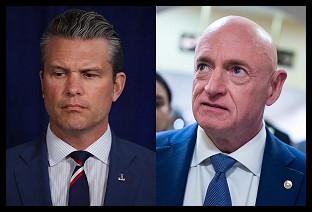 Court Blocks Hegseth Censure of Sen. Mark Kelly
Court Blocks Hegseth Censure of Sen. Mark Kelly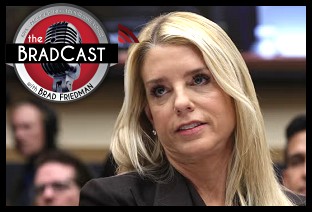 Harpy Tantrums, Legal Losses, Election Fails, Retreating ICE and Other Hopeful Signs: 'BradCast' 2/12/26
Harpy Tantrums, Legal Losses, Election Fails, Retreating ICE and Other Hopeful Signs: 'BradCast' 2/12/26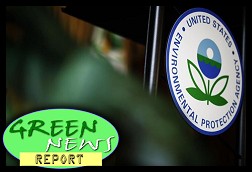 'Green News Report' 2/12/26
'Green News Report' 2/12/26
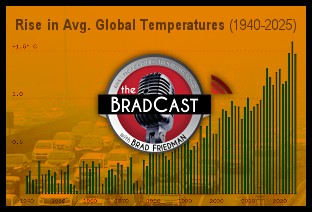 'Let Kids with Asthma Suffer': Trump to Reverse EPA's Landmark 'Endangerment Finding': 'BradCast' 2/11/26
'Let Kids with Asthma Suffer': Trump to Reverse EPA's Landmark 'Endangerment Finding': 'BradCast' 2/11/26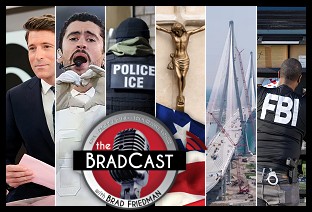 Trump's Presidency Now About Little More Than Racism, Corruption, Culture War Nonsense: 'BradCast' 2/10/26
Trump's Presidency Now About Little More Than Racism, Corruption, Culture War Nonsense: 'BradCast' 2/10/26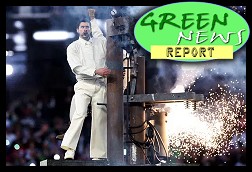 'Green News Report' 2/10/26
'Green News Report' 2/10/26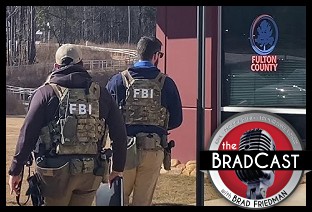 About Trump's FBI Raid of the Fulton County, GA Elections Warehouse: 'BradCast' 2/9/26
About Trump's FBI Raid of the Fulton County, GA Elections Warehouse: 'BradCast' 2/9/26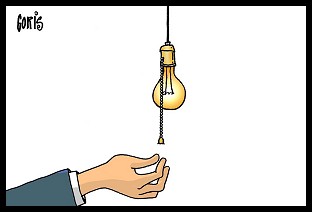 Sunday 'Dead in Darkness' Toons
Sunday 'Dead in Darkness' Toons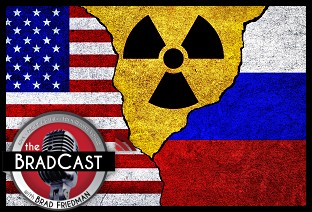 'New START' Treaty Allowed to End Amid New World Disorder: 'BradCast' 2/5/26
'New START' Treaty Allowed to End Amid New World Disorder: 'BradCast' 2/5/26 'Green News Report' 2/5/26
'Green News Report' 2/5/26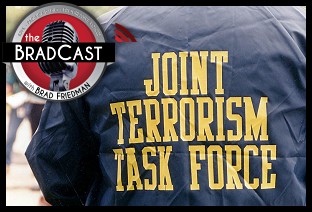 Trump Turns 'War on Terror' Tools Against Domestic Political Foes: 'BradCast' 2/4/26
Trump Turns 'War on Terror' Tools Against Domestic Political Foes: 'BradCast' 2/4/26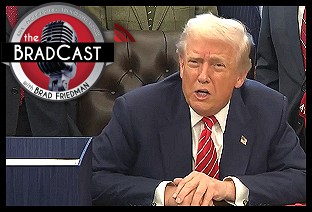 Losing Legally and Politically, Trump Threatens to 'Nationalize' Elections: 'BradCast' 2/3/26
Losing Legally and Politically, Trump Threatens to 'Nationalize' Elections: 'BradCast' 2/3/26 'Green News Report' 2/3/26
'Green News Report' 2/3/26 Bad and Good Bunnies, and an Electoral Shock in Deep 'Red' TX: 'BradCast' 2/2/26
Bad and Good Bunnies, and an Electoral Shock in Deep 'Red' TX: 'BradCast' 2/2/26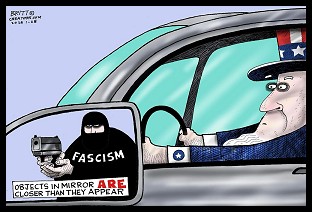 Sunday 'Mirror, Mirror' Toons
Sunday 'Mirror, Mirror' Toons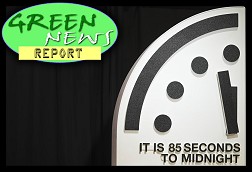 'Green News Report' 1/29/26
'Green News Report' 1/29/26 It's About Elections and the Windmills of His Mind: 'BradCast' 1/29/26
It's About Elections and the Windmills of His Mind: 'BradCast' 1/29/26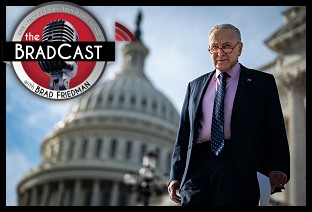 Govt Shutdown Over ICE Funding Near Certain This Weekend: 'BradCast' 1/28/26
Govt Shutdown Over ICE Funding Near Certain This Weekend: 'BradCast' 1/28/26 Trump Blinks, Bovino Out, MN Op Falters, Persists as Midterms Loom: 'BradCast' 1/27
Trump Blinks, Bovino Out, MN Op Falters, Persists as Midterms Loom: 'BradCast' 1/27 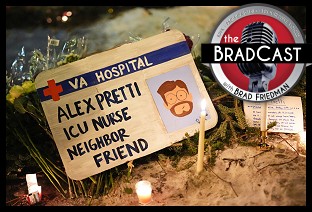 The ICE Murder of ICU Nurse Alex Pretti and the Heroes of Mpls: 'BradCast' 1/26/26
The ICE Murder of ICU Nurse Alex Pretti and the Heroes of Mpls: 'BradCast' 1/26/26  The BRAD BLOG: 22 Years and Still Counting
The BRAD BLOG: 22 Years and Still Counting Mr. Smith Testifies (Publicly) in Washington: 'BradCast' 1/22/26
Mr. Smith Testifies (Publicly) in Washington: 'BradCast' 1/22/26 World Turning Against Self-Destructing U.S. Under Trump: 'BradCast' 1/21/26
World Turning Against Self-Destructing U.S. Under Trump: 'BradCast' 1/21/26 Trump Waste, Fraud, Abuse on Voting, at DOJ, by DOGE: 'BradCast' 1/20/26
Trump Waste, Fraud, Abuse on Voting, at DOJ, by DOGE: 'BradCast' 1/20/26
 VA GOP VOTER REG FRAUDSTER OFF HOOK
VA GOP VOTER REG FRAUDSTER OFF HOOK Criminal GOP Voter Registration Fraud Probe Expanding in VA
Criminal GOP Voter Registration Fraud Probe Expanding in VA DOJ PROBE SOUGHT AFTER VA ARREST
DOJ PROBE SOUGHT AFTER VA ARREST Arrest in VA: GOP Voter Reg Scandal Widens
Arrest in VA: GOP Voter Reg Scandal Widens ALL TOGETHER: ROVE, SPROUL, KOCHS, RNC
ALL TOGETHER: ROVE, SPROUL, KOCHS, RNC LATimes: RNC's 'Fired' Sproul Working for Repubs in 'as Many as 30 States'
LATimes: RNC's 'Fired' Sproul Working for Repubs in 'as Many as 30 States' 'Fired' Sproul Group 'Cloned', Still Working for Republicans in At Least 10 States
'Fired' Sproul Group 'Cloned', Still Working for Republicans in At Least 10 States FINALLY: FOX ON GOP REG FRAUD SCANDAL
FINALLY: FOX ON GOP REG FRAUD SCANDAL COLORADO FOLLOWS FLORIDA WITH GOP CRIMINAL INVESTIGATION
COLORADO FOLLOWS FLORIDA WITH GOP CRIMINAL INVESTIGATION CRIMINAL PROBE LAUNCHED INTO GOP VOTER REGISTRATION FRAUD SCANDAL IN FL
CRIMINAL PROBE LAUNCHED INTO GOP VOTER REGISTRATION FRAUD SCANDAL IN FL Brad Breaks PA Photo ID & GOP Registration Fraud Scandal News on Hartmann TV
Brad Breaks PA Photo ID & GOP Registration Fraud Scandal News on Hartmann TV  CAUGHT ON TAPE: COORDINATED NATIONWIDE GOP VOTER REG SCAM
CAUGHT ON TAPE: COORDINATED NATIONWIDE GOP VOTER REG SCAM CRIMINAL ELECTION FRAUD COMPLAINT FILED AGAINST GOP 'FRAUD' FIRM
CRIMINAL ELECTION FRAUD COMPLAINT FILED AGAINST GOP 'FRAUD' FIRM RICK SCOTT GETS ROLLED IN GOP REGISTRATION FRAUD SCANDAL
RICK SCOTT GETS ROLLED IN GOP REGISTRATION FRAUD SCANDAL VIDEO: Brad Breaks GOP Reg Fraud Scandal on Hartmann TV
VIDEO: Brad Breaks GOP Reg Fraud Scandal on Hartmann TV RNC FIRES NATIONAL VOTER REGISTRATION FIRM FOR FRAUD
RNC FIRES NATIONAL VOTER REGISTRATION FIRM FOR FRAUD EXCLUSIVE: Intvw w/ FL Official Who First Discovered GOP Reg Fraud
EXCLUSIVE: Intvw w/ FL Official Who First Discovered GOP Reg Fraud GOP REGISTRATION FRAUD FOUND IN FL
GOP REGISTRATION FRAUD FOUND IN FL

































